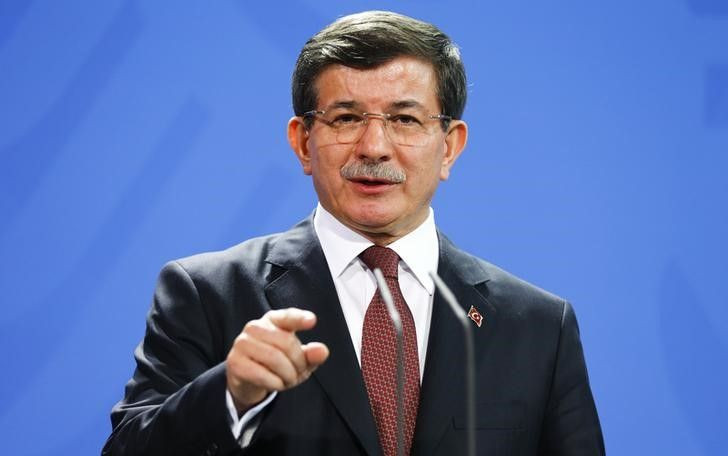Turkey, Israel Spat Among International Political Responses To Paris Attacks

The Charlie Hebdo and kosher market attacks in Paris last week have set off a new round of political sniping between Israel and Turkey’s governments, with Turkish Prime Minister Ahmet Davutoğlu on Thursday comparing his Israeli counterpart Benjamin Netanyahu to the terrorists who killed 17 people in last week’s murder spree. The remarks are the latest escalation in a war of words between the two countries and show that ties between the formerly close allies are near their lowest point in years, experts said.
The public tension between the two governments is representative of the “poor,” “frozen” state of Israel-Turkey bilateral relations, said Elliott Abrams, a former State Department official and senior fellow for Middle Eastern Studies at the Council on Foreign Relations in Washington. Abrams said that while ties between the two were “not at their absolute lowest point,” they were still approaching the levels that were seen in 2010 after an Israeli raid on a Turkish aid flotilla to Gaza.
Nine Turkish activists were killed on board the Mavi Marmara, the flotilla flagship, after Israeli commandos stormed the vessel, in an incident that irrevocably altered the once-robust ties between the two Middle Eastern nations. Though Israel and Turkey have continued to maintain diplomatic and commercial ties since the incident, their previously strong intelligence and military links are “gone,” said Abrams.
Both governments have traded increasingly heated words since Sunday’s anti-terror solidarity march in Paris that both Netanyahu and Davutoğlu attended along with other world leaders. Turkish President Recep Tayyip Erdoğan blasted Netanyahu’s attendance at the event, questioning how he “dared” participate given the Israeli government’s actions in the Gaza war over the summer in which 2,100 mostly civilian Palestinians were killed, according to Reuters. Netanyahu hit back at the Turkish leader on Wednesday, calling his remarks “shameful” and saying they needed to be “repudiated by the international community,” reported Agence France-Presse.
Other prominent members of both governments have also jumped into the fray. Israeli Foreign Minister Avigdor Lieberman called Erdoğan an “anti-Semitic bully,” while Turkish presidential spokesman Ibrahim Kalin said it was “Islamophobic” of Netanyahu to link the Paris attacks to Islam and that the Israeli government needed to “halt its aggressive and racist policies instead of attacking others.”
There is not much prospect that the dynamics between the two countries will improve in the near future, said Eric Edelman, a former undersecretary of defense in the Bush administration and a former U.S. ambassador to Turkey. “As long as Erdoğan and his party are in power, they will continue to voice these views,” he said. “This is just a particularly egregious example of something that's been a continual problem.”
The Turkish government’s comments in the aftermath of the Paris attacks -- including its attacks on Israel -- are motivated by a desire to divert its people’s attention from a number of issues at home, said Edelman. This includes a crackdown on journalists covering a corruption probe that has embroiled members of Erdoğan's ruling AKP party. One Turkish journalist was arrested for a single tweet about the case in late December, according to the Washington Post. The government’s growing crackdown has landed Turkey on the Committee to Protect Journalists list of the world’s worst jailers of journalists.
In the aftermath of the Paris attacks, Turkey’s government has in recent days targeted the Istanbul offices of the opposition newspaper Cumhuriyet, which published excerpts from Charlie Hebdo’s latest issue. The “survivor’s edition” of the satirical magazine, the first issue to be published since the murderous attack in Paris, attracted condemnation from around the Muslim world for featuring a cartoon of the Prophet Muhammad on its cover. A Turkish court also banned Web pages showing the new cover, reported CNN.
Other nations have also reacted to the Paris attacks with policy debates. On Wednesday, Egypt moved to ban the magazine after President Abdelfattah al-Sisi issued a decree that would give Prime Minister Ibrahim Mahlab the power to ban any foreign publication deemed “offensive to religion.” The decree came amid mounting criticism from influential religious bodies within the country.
In the U.S., Republicans were forced to reconsider their plans to force a showdown with President Barack Obama over funding for the Department of Homeland Security, which spearheads U.S. counterterrorism efforts, reported Reuters. Republicans had planned to use the battle battle to challenge the president on immigration, but certain members of the party cautioned against pursuing such a course in the wake of the terror attacks.
In China, the government’s condemnation of the Paris shooting was accompanied by stepped up restrictions in its far western Xinjiang province, which is home to the country’s minority Uighur Muslim population. On Wednesday, Communist Party authorities passed a law to prohibit women from wearing burqas in public, reported CNN. The move is seen as the latest discriminatory measure against the province’s Muslim majority, which has complained of Beijing’s repressive rule for years.
© Copyright IBTimes 2025. All rights reserved.






















